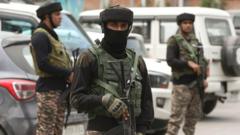A high-ranking leader of the Maoist movement has been killed during a crackdown by Indian security forces in Chhattisgarh.
Top Maoist Figure Neutralized Amid Intensified Indian Government Operations

Top Maoist Figure Neutralized Amid Intensified Indian Government Operations
Authorities report significant success against Maoist insurgents in India following recent confrontation in Chhattisgarh.
In a significant development, Indian security forces have engaged in a fierce battle with Maoist rebels in Chhattisgarh, resulting in the death of Nambala Keshava Rao, also known as Basavaraju. The Home Minister, Amit Shah, confirmed that 27 rebels were killed in the operation, marking a notable achievement for government forces as it is the first instance in three decades that such a senior Maoist leader has been eliminated.
The clash erupted in Narayanpur district following intelligence that senior Maoist figures were present in the area. Alongside Rao, Indian authorities reported the death of one police officer in the encounter. For context, Rao held the position of general secretary within the banned Communist Party of India (Maoist) and was listed among the most wanted individuals by the National Investigation Agency (NIA), India's counter-terrorism unit.
Prime Minister Narendra Modi expressed pride in the forces' accomplishment, while the Communist Party of India condemned the killings and called for an independent investigation into the incident. This operation, part of a larger military offensive termed "Black Forest," has resulted in the arrest of 54 rebels and the surrender of 84 individuals across Chhattisgarh, Telangana, and Maharashtra.
The Maoist insurgency, which draws inspiration from China's Mao Zedong and began in the late 1960s in West Bengal, has since expanded to control regions across a "red corridor" in over a third of India’s districts. Despite enforced military measures pushing back the rebels, violence remains prevalent, with numerous fatalities reported annually. The government claims that around 287 rebels were killed in military operations last year, predominantly in Chhattisgarh, contributing to an estimated toll of over 10,000 lives lost since the 1960s.
The clash erupted in Narayanpur district following intelligence that senior Maoist figures were present in the area. Alongside Rao, Indian authorities reported the death of one police officer in the encounter. For context, Rao held the position of general secretary within the banned Communist Party of India (Maoist) and was listed among the most wanted individuals by the National Investigation Agency (NIA), India's counter-terrorism unit.
Prime Minister Narendra Modi expressed pride in the forces' accomplishment, while the Communist Party of India condemned the killings and called for an independent investigation into the incident. This operation, part of a larger military offensive termed "Black Forest," has resulted in the arrest of 54 rebels and the surrender of 84 individuals across Chhattisgarh, Telangana, and Maharashtra.
The Maoist insurgency, which draws inspiration from China's Mao Zedong and began in the late 1960s in West Bengal, has since expanded to control regions across a "red corridor" in over a third of India’s districts. Despite enforced military measures pushing back the rebels, violence remains prevalent, with numerous fatalities reported annually. The government claims that around 287 rebels were killed in military operations last year, predominantly in Chhattisgarh, contributing to an estimated toll of over 10,000 lives lost since the 1960s.






















